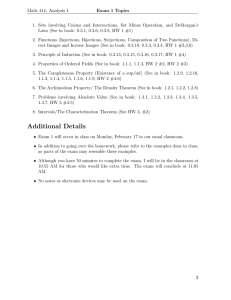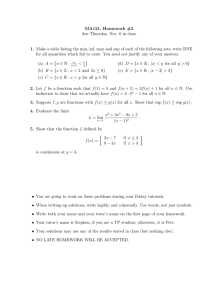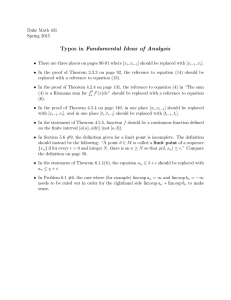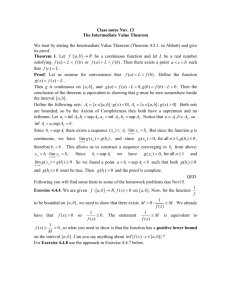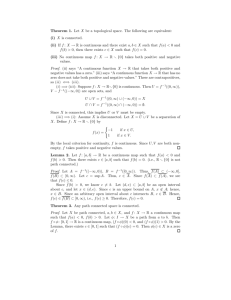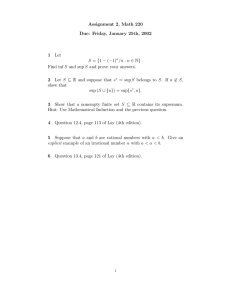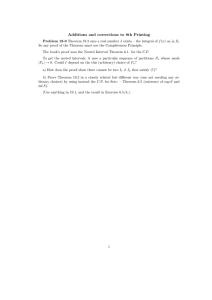Lecture 1
advertisement
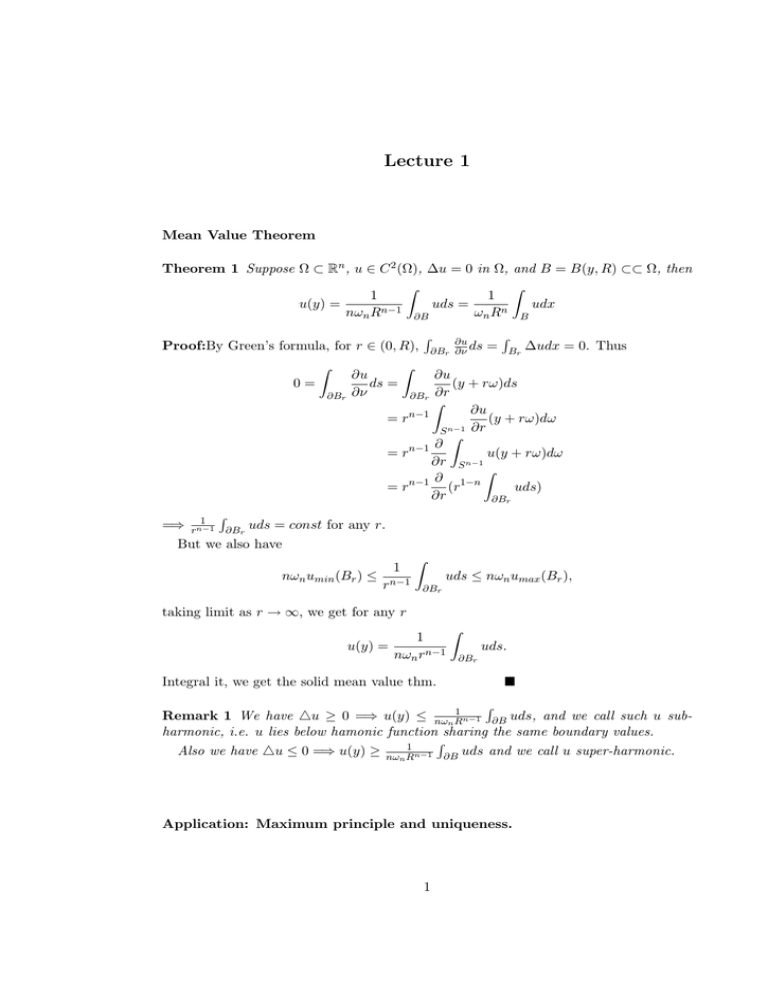
Lecture 1
Mean Value Theorem
Theorem 1 Suppose Ω ⊂ Rn , u ∈ C 2 (Ω), Δu = 0 in Ω, and B = B(y, R) ⊂⊂ Ω, then
�
�
1
1
u(y) =
uds =
udx
nωn Rn−1 ∂B
ωn R n B
�
Proof:By Green’s formula, for r ∈ (0, R),
�
0=
∂Br
=⇒
1
r n−1
�
∂Br
∂u
ds =
∂ν
∂u
∂Br ∂ν ds
=
�
Br
Δudx = 0. Thus
�
∂u
(y + rω)ds
∂Br ∂r
�
∂u
= rn−1
(y + rω)dω
S n−1 ∂r
�
∂
= rn−1
u(y + rω)dω
∂r S n−1
�
∂
= rn−1 (r1−n
uds)
∂r
∂Br
uds = const for any r.
But we also have
nωn umin (Br ) ≤
1
rn−1
�
uds ≤ nωn umax (Br ),
∂Br
taking limit as r → ∞, we get for any r
1
u(y) =
nωn rn−1
Integral it, we get the solid mean value thm.
�
uds.
∂Br
�
�
1
Remark 1 We have �u ≥ 0 =⇒ u(y) ≤ nωn R
n−1 ∂B uds, and we call such u sub­
harmonic, i.e. u lies below hamonic function sharing the same boundary values.
�
1
Also we have �u ≤ 0 =⇒ u(y) ≥ nωn R
n−1 ∂B uds and we call u super­harmonic.
Application: Maximum principle and uniqueness.
1
Theorem 2 Ω ⊂ Rn , u ∈ C 2 (Ω), Δu ≥ 0, If ∃p ∈ Ω s.t.
u(p) = max u,
Ω
then u is constant.
Proof: Let
ΩM = {x ∈ Ω|u(x) = M }.
M = sup u,
Ω
ΩM is not empty because p ∈ M , ΩM is closed by continuity, ΩM is open by mean
value inequality. Thus ΩM = M , i.e. u is constant function.
�
Corollary 1 u ∈ C 2 (Ω)
�
C 0 (Ω), Δu = 0, then if Ω bounded, we have
inf u ≤ sup,
∂Ω
Corollary 2 u, v ∈ C 2 (Ω)
�
x ∈ Ω.
∂Ω
C 0 (Ω), Δu = Δv in Ω, u = v on ∂Ω =⇒ u ≡ v on ∂Ω.
Corollary 3 Δu ≥ 0, Δv = 0, u ≡ v on ∂Ω =⇒ u ≤ v in Ω. (Hence ”subharmonic” )
Application: Harnack Inequality.
Theorem 3 Suppose Ω domain, u ∈ C 2 (Ω), Δu = 0, Ω� ⊂⊂ Ω, u ≥ 0 in Ω, then ∃
constant C = C(n, Ω, Ω� ) s.t.
sup u ≤ C inf� u.
Ω
Ω�
Proof: Let y ∈ Ω� , B(y, 4R) ⊂ Ω. Take x1 , x2 ∈ B(y, R), we have
�
�
1
1
u(x1 ) =
udx,
udx ≤
ωn Rn B(x1 ,R)
ωn Rn B(y,2R)
�
�
1
1
udx ≥
udx,
u(x2 ) =
ωn (3R)n B(y,2R)
ωn (3R)n B(x2 ,3R)
=⇒ u(x1 ) ≤ 3n u(x2 ),
=⇒ sup ≤ 3n inf .
B(y,R)
B(y,R)
Choose R little enough s.t. B(y, 4R) ⊂ Ω for ∀y ∈ Ω� . Let x1 , x2 ∈ Ω� s.t. to be
maximal and minimal point of u in Ω� respectively. We can cover Ω� by N balls of
radius R since Ω� is compact, so we have
sup u ≤ u(x1 ) ≤ 3n u(x�1 ) ≤ · · · ≤ 3nN inf� u.
Ω
Ω�
This completes our proof.
�
2
Remark 2 1. A Harnack inequality implies C α regularity for 0 < α < 1.
2. A positive (or more generally bounded above or below) harmonic function on Rn is
constant.
A Priori Estimate for harmonic function.
Theorem 4 u ∈ C ∞ , Δu = 0, Ω� ⊂ Ω. Then for multi­index α, there exists constant
C = C(n, α, Ω, Ω� ) s.t.
sup |Dα u| ≤ C sup |u|.
Ω�
Ω
∂
∂
Δ = Δ ∂x
, Du is also harmonic. So by mean value theorem and
Proof: Since ∂x
i
i
divergence theorems, we have for B(y, R) ⊂ Ω,
�
�
1
1
−
Du(y) =
Dudx =
u→
ν ds
ωn Rn B(y,R)
ωn Rn ∂B
n
sup |u|
R ∂B
n
=⇒ |Du(y)| ≤
sup |u|.
d(y, ∂Ω) Ω
=⇒ |Du(y)| ≤
By induction, we get the stated estimate for higher order derivatives.
�
Remark 3 We can weaken the assumptions to u ∈ C 2 (Ω): u ∈ C 2 (Ω) and Δu = 0 =⇒
u analytic. We will do this next time.
Green’s Representation Formula.
Suppose Ω is C 1 domain, u, v ∈ C 2 (Ω).
Green’s 1st identity:
�
�
�
vΔudx +
Du · Dvdx =
Ω
Green’s
2nd
Ω
∂Ω
v
∂u
ds.
∂ν
identity:
�
�
(vΔu − uΔv)dx =
Ω
(v
∂Ω
∂u
∂v
− u )ds.
∂ν
∂ν
Find solution for Laplacian:
�
Γ(x) =
1
2−n
n(2−n)ωn |x|
1
2π log |x|
Note that away from origin, ΔΓ(x) = 0.
3
, n > 2,
, n = 2.
Theorem 5 Suppose u ∈ C 2 (Ω), then for y ∈ Ω, we have
�
�
∂u
∂Γ
Γ(x − y)Δudx.
u(y) =
(u (x − y) − Γ(x − y) )dσ +
∂ν
∂ν
Ω
∂Ω
Proof: Take ρ small enough s.t. Bρ = Bρ (y) ⊂ Ω. Apply Green’s 2nd formula to u
and v(x) = Γ(x − y), which is harmonic in Ω \ {y}, on the domain Ω \ Bρ , we get
�
�
�
∂u
∂Γ
∂u
∂Γ
Γ(x−y)Δudx =
(Γ(x−y) −u (x−y))dσ+
(Γ(x−y −u (x−y)))dσ.
∂ν
∂ν
∂ν
∂ν
Ω\Bρ
∂Ω
∂Br ho
Let ρ → 0, notice that as ρ → 0
�
∂u
|
Γ(x − y) dσ | ≤ Γ(ρ) sup |Du|nωn ρn−1 → 0,
∂ν
Bρ
∂Bρ
�
∂Γ
u (x − y)dσ = −Γ� (ρ)
∂Br ho ∂ν
−1
udσ =
nωn ρn−1
∂Bρ
�
thus we get the Green’s Representation Formula.
�
udσ → −u(y),
∂Bρ
�
Application of Green’s Formula:
Theorem 6 Let B = BR (0) and ϕ is continuous function on ∂B. Then
� 2 2 �
ϕ(y)
R −|x |
nωn R
∂B |x−y |n ds , x ∈ B,
u(x) =
ϕ(x)
, x ∈ ∂B.
belongs to C 2 (B) ∩ C 0 (B) and satisfies Δu = 0 in B.
4
